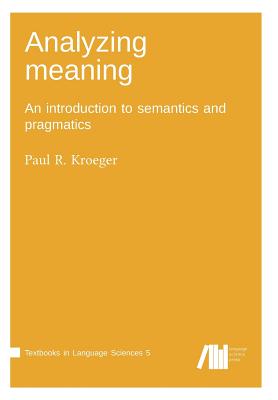Analyzing meaning

Analyzing meaning
This book provides an introduction to the study of meaning in human language, from a linguistic perspective. It covers a fairly broad range of topics, including lexical semantics, compositional semantics, and pragmatics. The chapters are organized into six units: (1) Foundational concepts; (2) Word meanings; (3) Implicature (including indirect speech acts); (4) Compositional semantics; (5) Modals, conditionals, and causation; (6) Tense & aspect. Most of the chapters include exercises which can be used for class discussion and/or homework assignments, and each chapter contains references for additional reading on the topics covered. As the title indicates, this book is truly an INTRODUCTION: it provides a solid foundation which will prepare students to take more advanced and specialized courses in semantics and/or pragmatics. It is also intended as a reference for fieldworkers doing primary research on under-documented languages, to help them write grammatical descriptions that deal carefully and clearly with semantic issues. The approach adopted here is largely descriptive and non-formal (or, in some places, semi-formal), although some basic logical notation is introduced. The book is written at level which should be appropriate for advanced undergraduate or beginning graduate students. It presupposes some previous coursework in linguistics, but does not presuppose any background in formal logic or set theory.
PRP: 232.50 Lei
Acesta este Prețul Recomandat de Producător. Prețul de vânzare al produsului este afișat mai jos.
209.25Lei
209.25Lei
232.50 LeiLivrare in 2-4 saptamani
Descrierea produsului
This book provides an introduction to the study of meaning in human language, from a linguistic perspective. It covers a fairly broad range of topics, including lexical semantics, compositional semantics, and pragmatics. The chapters are organized into six units: (1) Foundational concepts; (2) Word meanings; (3) Implicature (including indirect speech acts); (4) Compositional semantics; (5) Modals, conditionals, and causation; (6) Tense & aspect. Most of the chapters include exercises which can be used for class discussion and/or homework assignments, and each chapter contains references for additional reading on the topics covered. As the title indicates, this book is truly an INTRODUCTION: it provides a solid foundation which will prepare students to take more advanced and specialized courses in semantics and/or pragmatics. It is also intended as a reference for fieldworkers doing primary research on under-documented languages, to help them write grammatical descriptions that deal carefully and clearly with semantic issues. The approach adopted here is largely descriptive and non-formal (or, in some places, semi-formal), although some basic logical notation is introduced. The book is written at level which should be appropriate for advanced undergraduate or beginning graduate students. It presupposes some previous coursework in linguistics, but does not presuppose any background in formal logic or set theory.
Detaliile produsului











